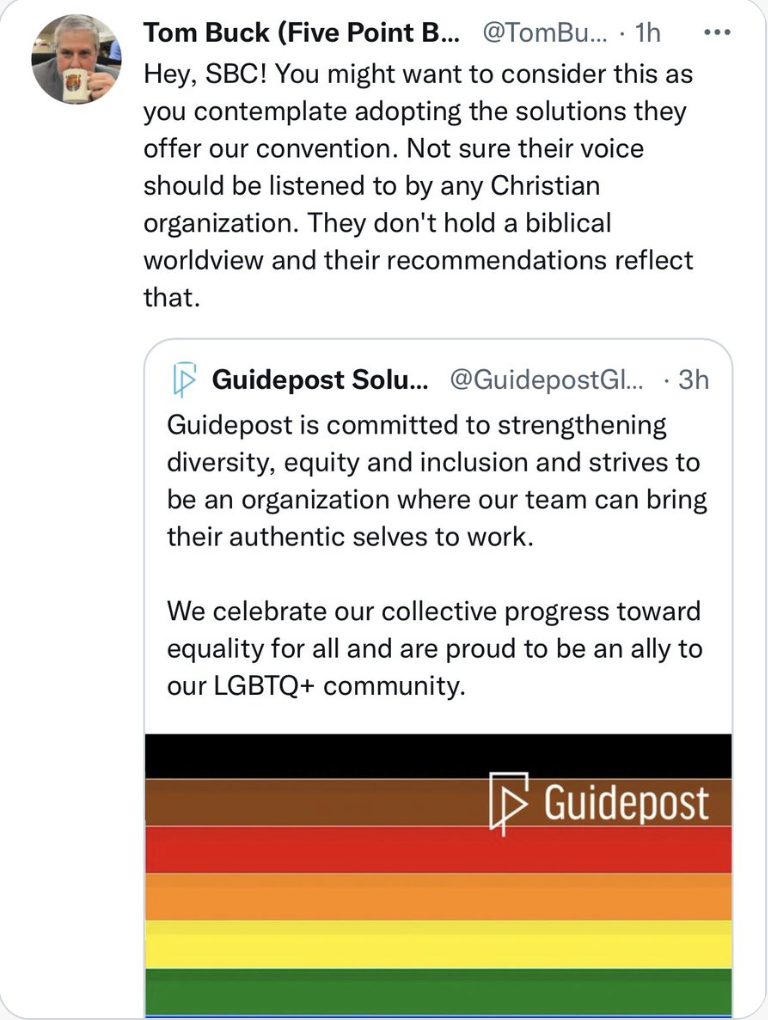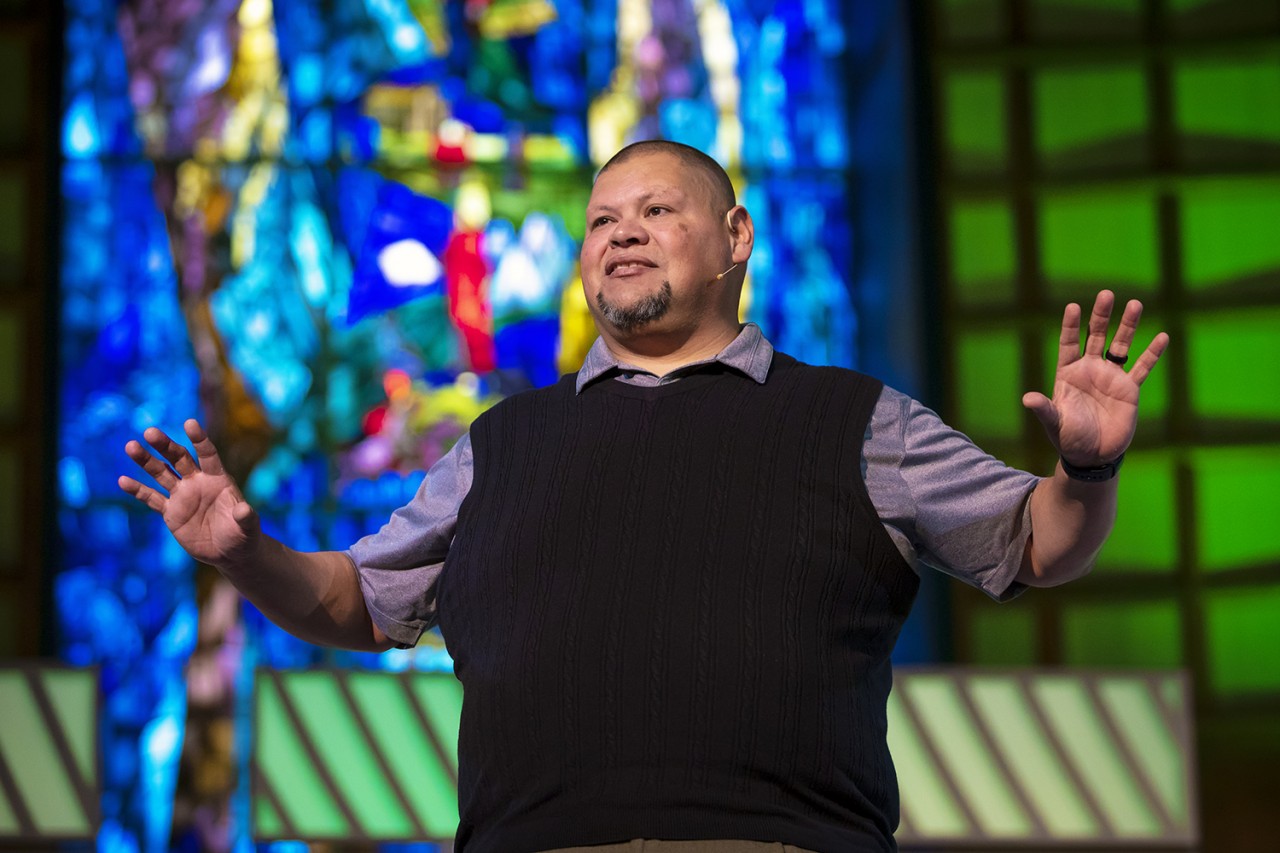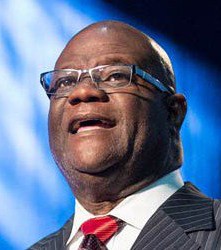There’s only one thing Southern Baptist Convention conservatives get more upset about than women serving as pastors: The slightest affirmation of LGBTQ persons.
This truth was borne out in the SBC over the last week as leaders sought to put out a three-alarm fire sparked by decisions made at the SBC Executive Committee. The denomination’s largest church was expelled because it allows women to serve as pastors, and a secular company that cares for its LGBTQ employees was selected to do more work on sexual abuse reform.
Thus, in the current moment, the threefold cord of sexuality, gender and abuse is not easily broken in the SBC. Instead, it’s the talk of the town.
For starters, understand that virtually everyone in SBC leadership is against LGBTQ inclusion or affirmation. The homophobia is so strong that last year a respected former president of the convention was lambasted merely for expressing affirmation of a sermon preached by his adult son, who is gay.
“For starters, understand that virtually everyone in SBC leadership is against LGBTQ inclusion or affirmation.”
The attack on Georgia pastor James Merritt, father of author and speaker Jonathan Merritt, came from the Conservative Baptist Network. That group, known as CBN for short, represents the far-right wing of the already very conservative denomination. Together with a group of SBC Calvinists known as Founders Ministries, CBN has run a relentless campaign against elected SBC leaders and staff members who they believe are “woke” and too friendly to “liberal” causes.
The duo of CBN and Founders Ministries also has been at the epicenter of criticizing the SBC’s investigation of mishandled knowledge of sexual abuse in SBC churches and agencies. These ultra-conservatives believe the problem of sexual abuse is not a crisis and has been vastly overblown. They also advocate strict male headship in their theology.
LGBTQ affirmation as a criticism of sexual abuse work
With a full sail of wind propelling the SBC toward a reckoning over sexual abuse in the past two years, these critics have found themselves in a distinct minority position. Unable to stop the independent investigation that found a pattern of male leaders ignoring women’s reports of abuse, they turned instead to criticize the independent firm conducting the investigation and now leading in implementation of changes.
The point of their attack is on LGBTQ affirmation.
 This line of attack first erupted last June — one week before the SBC annual meeting — because Guidepost Solutions put out a single tweet affirming its LGBTQ employees.
This line of attack first erupted last June — one week before the SBC annual meeting — because Guidepost Solutions put out a single tweet affirming its LGBTQ employees.
On June 6, Guidepost tweeted its commitment “to strengthening diversity, equity and inclusion” as an organization that welcomes employees to “bring their authentic selves to work.” It called the company “an ally to our LGBTQ+ community.” The tweet was accompanied by the image of a rainbow flag.
This was the smoking gun critics of the sexual abuse investigation needed to rally their troops. One tweet from a secular company with 200 employees in a diverse marketplace.
The SBC has a zero-tolerance policy for LGBTQ affirmation. Thus, even those supportive of the sexual abuse investigation had to bend over backward to justify the selection of Guidepost and explain why this single tweet did not invalidate their work on sexual abuse.
The critics responded by saying any company that affirms “sexual immorality” cannot be trusted to investigate sexual abuse.
One more round with Guidepost
Thus, it was a surprise last week when the SBC Executive Committee voted to hire the same company, Guidepost Solutions, to operate its online database of clergy sexual abusers.
“It also was a surprise to learn the lengths to which this $76 million company has gone to keep the SBC’s business.”
It also was a surprise to learn the lengths to which this $76 million company has gone to keep the SBC’s business. Executive Committee members were told Guidepost has created a separate division, called Faith-Based Solutions, and named as its leader Samantha Kilpatrick, “an attorney of faith” who earned a counseling degree from the SBC’s Southeastern Baptist Theological Seminary.
But none of this was enough to satisfy the critics, who have continued to hammer SBC leadership for being weak on LGBTQ condemnation. In less than a week since the new contract with Guidepost and Faith-Based Solutions was announced, debate over the issue has once again consumed the SBC dialogue on Twitter.

Mike Stone
For example, Georgia pastor and failed SBC presidential candidate Mike Stone — who was chairman of the SBC Executive Committee during the period under recent investigation — published a critique: “Hiring a company that openly supports sexual perversion to help us deal with accusations of sexual perversion is simply a bridge too far. If such a partnership is truly the best option on this road, as some well-intentioned brothers and sisters believe it is, perhaps it is also a bridge too far in the wrong direction.”
Tom Ascol, leader of Founders Ministries and the far-right’s unsuccessful candidate for SBC president last year, tweeted multiple times about the Executive Committee and Guidepost. In one tweet he said: “The @SBCExecComm & #ARITF have made a major mistake in selecting a sexual perversion affirming, pro-abortion organization to deal with, of all things, sex abuse!”
These criticisms have been so common that both the president of the convention and a prominent member of the Abuse Reform Implementation Task Force jumped into the Twitter fray.
Barber and Keahbone respond
SBC President Bart Barber, a conservative Texas pastor, tweeted a biblical retort to the CBN and Founders contingency: “You have heard it said that Guidepost Solutions takes your SBC money and uses it to fund LGBTQ events. But I tell you that the most leftist cause to which Guidepost has ever contributed is a police association (bunch of commies, those boys in blue). They’re lying to you.”
Mike Keahbone, an Oklahoma pastor who serves on the task force, wrote a multi-part tweet to debunk the rumors being spread by the far-right in the SBC.
“When we vetted Guidepost, we asked: ‘What charities do you financially support?’ Their answer: ‘Law enforcement.’ They only give to supporting law enforcement and their families. We sat with their leadership, face to face, as they substantiated their giving.

Mike Keahbone
“We asked about ‘the tweet,’ he continued. “Their answer: As a secular company they support their employees by following non-discrimination laws and policies. As we described what this tweet caused, in our world, they determined that using Twitter was no longer an option for them. As you can easily find, their Twitter account has not been active since October of 2022.
“In addition, without our prompting, Guidepost created a new wing of their company designed to serve faith-based organizations. Guidepost will not be making moral decisions for us. That’s the responsibility of our convention. Guidepost was the highest scoring company in our compatibility chart, by far, which can be seen on our ARITF website. It is not even close.
“As a pastor, I want to be in line with Lord and do things right. I had the same concerns as everyone else, but in asking questions and finding clarity, my heart was settled,” he wrote. I’m just trying to share some of that clarity with those who will receive it. I am always open to answer questions from those who are truly seeking answers but will not respond to those who are disrespectful and rude.”
Fallout over Saddleback
Meanwhile, the firestorm of criticism for expelling Saddleback Church in Southern California and four other congregations with female leaders — one of which wasn’t actually affiliated with the SBC — grew over the last week.
This extreme action, which was prompted by the CBN/Founders coalition, made national headlines and left some otherwise devout conservatives in the SBC calling for reconsideration.

Adam Greenway (Baptist Press)
Chief among those was Adam Greenway, former president of Southwestern Baptist Theological Seminary. At last summer’s SBC annual meeting, he offered a motion designed to delay or prevent the kind of bad press the SBC has endured in the past week, but that motion failed. His motion asked for a study of how closely a church must adhere to the Baptist Faith and Message, the SBC’s doctrinal statement, to be considered “in friendly cooperation.”
“Yesterday’s action by the @SBCExecComm to disfellowship Saddleback was, in my view, both premature and unwise, regardless of one’s view of ‘women pastors,’” Greenway tweeted. “The SBCEC should not seek to use its ad interim authority to take actions in areas where the SBC is divided in opinion.
“An easy retort is, ‘The SBC has spoken! The BFM is against women pastors!’ Despite what others may claim, the issue is not that simple. The SBC has NEVER required any church to affirm positively the BFM in toto in order to be deemed ‘in friendly cooperation’ with the convention,” he continued. “Moreover, despite claims to the contrary, I believe an accurate reading of history reveals that the SBC consensus in the year 2000 was that the BFM revision referencing the ‘office of pastor’ was clearly understood to mean then what is meant today by ‘senior’ or ‘lead’ pastor.”
He added: “By taking action, the SBCEC imposed their interpretation here. Article III of the SBC Constitution contains the elastic clause of ‘closely identifying with the BFM as the requirement for cooperating churches. But that same article specifically enumerates three and only three clear disqualifications: affirming homosexuality, racism, abuse. These three disqualifying conditions provide an objective basis for determining SBC church cooperation. Anything beyond these three moves are simply subjective judgment calls. By taking the action they did, the SBCEC became a magisterium, authoritatively interpreting the BFM.”
“That same article specifically enumerates three and only three clear disqualifications: affirming homosexuality, racism, abuse. These three disqualifying conditions provide an objective basis for determining SBC church cooperation.”
Greenway charged that the Executive Committee’s action “establishes a terrible precedent and one that, regardless of what side of the ‘women pastors’ issue one falls on, should concern the SBC. The convention has provided no direct instruction to the SBCEC to take such an action. The BFM is not the SBC’s creed.”
Later, he concluded: “There seems to be a sentiment in today’s SBC that wants to purify the convention and sees ‘women pastors’ as a huge threat to biblical authority and a slippery slope toward liberalism and drift. A few years ago, it was Calvinism. Perhaps it will be something else later on. Whatever the issue may be, if it becomes clear to Southern Baptists that it’s time to make it a test of fellowship, then let’s amend Article III … but let’s do it with full SBC debate and consideration of all that we stand to gain or lose. Until then, I hope Southern Baptists will work to expend less energy and effort trying to kick out more churches who want to be in friendly cooperation with us. Let’s give our best to being the kind of SBC churches want to affiliate with, not the kind they want to leave.”
McKissic and Cole weigh in
Also critical of the Saddleback expulsion was Dwight McKissic, pastor of Cornerstone Baptist Church in Arlington, Texas. McKissic already has been wary of continued affiliation with the SBC because of its hard line against so-called “Critical Race Theory.” Even though he is a theological conservative, as a Black man he sees the reality of systemic racism, he has said.
“It’s driven by power, male supremacy; and it stinks in the nostrils of God.”
He also believes the role of women in church leadership should not be a test of fellowship.

Dwight McKissic
The decision to disfellowship Saddleback was not about Scripture or adherence to the Baptist Faith and Message, he said. “It’s driven by power, male supremacy; and it stinks in the nostrils of God.”

Benjamin Cole
Another person sounding an alarm over the Saddleback expulsion is Benjamin Cole, a former pastor active in SBC life who tweets frequently about convention matters under the name Baptist Blogger. Cole gave an interview to the Los Angeles Times.
“What is happening now seems to me to be a great divorce from Baptist history and heritage,” Cole told the Times. “We may not only be losing Saddleback Church and Rick Warren. We may be losing our identity.”
He declared: “Southern Baptists have always been more concerned about distributing life jackets to people who are drowning than straitjackets. And what the convention is now being forced to answer is whether or not we will pass out straitjackets to our churches rather than life jackets to the communities around us in need of hope.”
Related articles:
Faced with damning sexual abuse investigation, some in SBC seek to discredit the investigators
SBC selects Guidepost Solutions to develop and administer clergy sexual abuse database
Southern Baptist Convention ousts its largest church, Saddleback, for having a woman pastor


